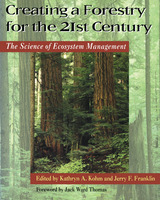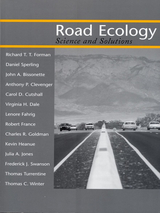
Over the past decade, a sea change has occurred in the field of forestry. A vastly increased understanding of how ecological systems function has transformed the science from one focused on simplifying systems, producing wood, and managing at the stand-level to one concerned with understanding and managing complexity, providing a wide range of ecological goods and services, and managing across broad landscapes.
Creating a Forestry for the 21st Century is an authoritative and multidisciplinary examination of the current state of forestry and its relation to the emergent field of ecosystem management. Drawing upon the expertise of top professionals in the field, it provides an up-to-date synthesis of principles of ecosystem management and their implications for forest policy. Leading scientists, including Malcolm Hunter, Jr., Bruce G. Marcot, James K. Agee, Thomas R. Crow, Robert J. Naiman, John C. Gordon, R.W. Behan, Steven L. Yaffee, and many others examine topics that are central to the future of forestry:
- new understandings of ecological processes and principles, from stand structure and function to disturbance processes and the movement of organisms across landscapes
- challenges to long-held assumptions: the rationale for clearcutting, the wisdom of short rotations, the exclusion of fire
- traditional tools in light of expanded goals for forest landscapes
- managing at larger spatial scales, including practical information and ideas for managing large landscapes over long time periods
- the economic, organizational, and political issues that are critical to implementing successful ecosystem management and developing institutions to transform knowledge into action

A central goal of transportation is the delivery of safe and efficient services with minimal environmental impact. In practice, though, human mobility has flourished while nature has suffered. Awareness of the environmental impacts of roads is increasing, yet information remains scarce for those interested in studying, understanding, or minimizing the ecological effects of roads and vehicles.
Road Ecology addresses that shortcoming by elevating previously localized and fragmented knowledge into a broad and inclusive framework for understanding and developing solutions. The book brings together fourteen leading ecologists and transportation experts to articulate state-of-the-science road ecology principles, and presents specific examples that demonstrate the application of those principles. Diverse theories, concepts, and models in the new field of road ecology are integrated to establish a coherent framework for transportation policy, planning, and projects. Topics examined include:
- foundations of road ecology
- roads, vehicles, and transportation planning
- vegetation and roadsides
- wildlife populations and mitigation
- water, sediment, and chemical flows
- aquatic ecosystems
- wind, noise, and atmospheric effects
- road networks and landscape fragmentation
READERS
Browse our collection.
PUBLISHERS
See BiblioVault's publisher services.
STUDENT SERVICES
Files for college accessibility offices.
UChicago Accessibility Resources
home | accessibility | search | about | contact us
BiblioVault ® 2001 - 2024
The University of Chicago Press









